First published in the Daily Maverick 168 weekly newspaper.
SA, like the US, has seen about half of its newsroom staff leave the industry since 2008. In the US, some of these losses were made up by positions in new digital-native operations. We must now be left to reconstruct the talent losses that left for safer and better-paying pastures, and figure out how to fulfil the demands of the new skills required in the modern-day media organisation.
As the great disruption came for the news industry, big (often bloated) organisations were squeezed by necessity and/or private equity raiders, who recognised that high-margin media businesses could still eke out profits if costs could be slashed faster than revenues were declining. Either way, the net effect was an exodus of editorial (and other) talent that more often than not went unfilled or was replaced by junior staffers at a fraction of the cost. At the same time, when corporate communication needs exploded to protect the profiteers, journalists with decades of experience were lost to the other side. Not so fun fact: Jeff Bezos employs more people in corporate communications at Amazon than he does journalists at The Washington Post.
An entire generation of journalists and editors no longer work in the industry, as the available positions were reduced and the rates of pay couldn’t keep up with corporate offers. And with reduced demand and a dire outlook for the industry, journalism students are being told to bypass careers in journalism owing to the lack of opportunities.
As the news media migrates from a business model reliant on advertising and cover prices towards reader revenue in the digital space, it is effectively a swing from B2B to B2C, or direct to consumer. This shift is not insignificant and requires an overhaul of strategies and a host of new skill sets to be developed. Examples include product and technology, data science, consumer marketing and e-commerce skills. The first hurdle is recognising the need for these new skill sets and then carving the scant budgets in a depressed environment for jobs that pay pretty well in the corporate sector, and where even local corporates compete with international players for those skills in South Africa.
The solution to these problems lies in a) incentivising experienced editorial staff back into the industry, b) ensuring a pipeline of talent eager to join, and c) being able to afford the talent in new skill sets.
In a previous column, I recommended that investor tax breaks could be offered to incentivise investments into accredited media organisations that were members of the Press Council. In a similar vein, members in good standing could be offered tax breaks that aid in the affordability of highly skilled staff. We saw temporary PAYE holidays used in Covid times to aid employer cash flow, so why not a permanent PAYE holiday for accredited media houses, for their top 35 employees? The number of employees is not trivial, because most organisations can build a strong leadership and management base alongside other senior positions with this number. The PAYE holiday could be used to offer more competitive rates of pay to skilled editorial and technical staff, attracting people back into the industry. We could even institute a media studies bursary programme where, say, 250 students per year (in journalism, management and technology) join accredited media houses after completing their studies on a government-funded “community service” programme, similar to the medical world, and ensuring a steady pipeline of talent.
These solutions rely on a willing government to play its role in furthering the cause of media as a cornerstone of democracy. It has already declared journalism an essential service and has the ability to pay more than lip service to efforts of sustainability. DM168
This story first appeared in our weekly Daily Maverick 168 newspaper which is available for free to Pick n Pay Smart Shoppers at these Pick n Pay stores.

















 Become an Insider
Become an Insider
Doubt that we have a willing gov’t, Styli, but I congratulate your optimism in the face of unprecedented opposition to the democratic project. I fear you are right, it’s just lip service, as is everything seemingly progressive in SA at the moment. One can dream that the electorate will awake and arise, but under COVID the likelihood is even slimmer.